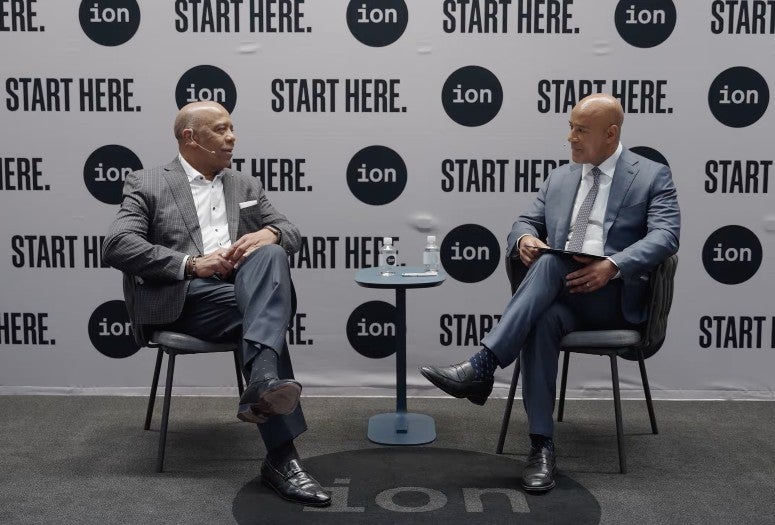Rice University continued its celebration of Black History Month with a special installment of the Ion’s “Visionary Voices” speaker series featuring Dr. Bernard Harris Jr., a NASA astronaut and the first Black American to walk in space. He is also a physician, company founder, CEO, philanthropist and venture capitalist.
President Reginald DesRoches hosted the fireside chat with Harris to explore his remarkable life, experiences and contributions.
The question of what ignited his curiosity for space exploration set the tone for the conversation.
“I am a kid of the 60s, so I grew up watching the space program develop right before my eyes,” Harris said. “When we landed on the moon, I said I wanted to be an astronaut.”
He then spoke about the bifurcated world he experienced in his childhood and how he views the importance of Black History Month.
“I could see some of the greatest accomplishments for human beings going to the moon, but I could turn the channel on the black and white television, and I could see Black people fighting for their rights,” he said. “I saw the dichotomy of great achievements but struggles at the same time.”
Harris eventually worked at NASA for 10 years, where he conducted research in musculoskeletal physiology and clinical investigations of space adaptation and developed in-flight medical devices to extend astronaut stays in space. A veteran astronaut for over 20 years, he has logged more than 438 hours and traveled over 7.2 million miles in space.
“Looking down at the Earth, you don’t see lines of latitude or longitude,” the astronaut said of his journeys in the cosmos. “You don’t see letters that say Germany, Russia or the United States on it. It gives you a great sense of togetherness and this notion that we should not be concerned about our differences but instead the things that are our commonality.”
He also made remarks about his hopes for the future of innovation, especially as it relates to STEM education and Rice’s role in promoting the future generation of entrepreneurs and inventors within minority groups.
“The thing I want is for all our communities to have the opportunity to be valuable citizens, to contribute financially and otherwise to this nation,” Harris said. “That’s one of the areas that we are not yet up to par. The way we get up to par as a community is to be involved in the innovation of the new technologies that are going to create the new jobs of the future.
“Unfortunately, the pipeline coming out of our school system [shows] students are not adequately trained for STEM jobs and later to become STEM entrepreneurs. That is something that is so important. It’s not just for our community, it’s for the nation.”
Rice is already mitigating this issue by investing in STEM education and performance with its many robust research centers, the Office of STEM Engagement and programs that reach both the K-12 and college student population like the Take Flight STEM Pathway and the Oshman Engineering Design Kitchen.
The conversation wrapped up with questions from the crowd of more than 500 people, which ranged in topics from career advice to space exploration.
Harris’ thoughtful final note to the audience was one of inspiration. “We’re changing the world, and we’re doing it together.”
More events and opportunities for engagement and conversation will continue through Black History Month at Rice. For more information, visit Rice.edu/BHM.

